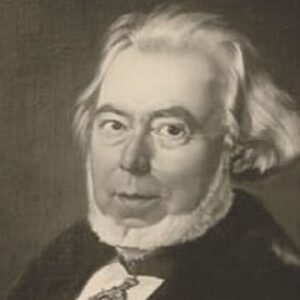Hugo von Mohl was a mid-nineteenth-century German botanist who was a key player in the nascent sciences of plant anatomy and physiology. His studies of the plant cell, particularly the cell wall and cell division, set the ground for the cell theory’s development. His contributions aided in the development of botany as a distinct scientific science. He was born into a well-respected family and acquired a classical education as the son of a statesman. He had a deep interest in botany and minerals since he was a child, which he followed in his spare time. Growing up, he studied medicine, but his passion for botany led him to Munich, where he collaborated with a group of renowned botanists and began his research. His research encompassed a wide range of botanical topics, and his description of protoplasm behavior during cell division garnered him a lot of attention. He spent his whole career as a professor of botany in Tübingen, immersing himself in research whenever he wasn’t lecturing. Throughout his career, he produced numerous significant contributions to botany, particularly in the area of plant cell anatomy. He was the first to postulate that new cells are generated through cell division, as well as the first to explain the role of osmosis in detail.
Childhood and Adolescence
Hugo von Mohl was born in Stuttgart, Germany, on April 8, 1805. Benjamin Ferdinand von Mohl, his father, was a Württemberg statesman. Hugo was the youngest of three brothers.
He acquired a classical education at the gymnasium, coming from a well-known family. He had a lifelong fascination with botany and mineralogy, which he pursued in his spare time.
In 1823, he began studying medicine at the University of Tübingen, and in 1827, he submitted a paper on the structure and movement of climbing plants. In 1828, he completed his Ph.D. dissertation on the composition of plant pores.
He proceeded to Munich after graduating with honors in medicine, where he became connected with a group of notable botanists and immersed himself in research.
The Career of Hugo
He was named professor of physiology at Bern in 1832, and professor of botany at Tübingen in 1835. He spent the rest of his career at Tübingen, focused on teaching and research.
He loved doing experiments in his laboratory because he was completely dedicated to science. He was a skilled craftsman who designed and manufactured his own optical instruments, including microscopes.
Despite his contributions to a variety of fields of botany, he is best known for his work on plant cells and the microscopic anatomy of plants.
During his plant cell studies, he theorized that the nucleus of the cell was contained within the granular, colloidal material that comprised the cell’s major composition. This substance was given the name “protoplasm” by Jan Evangelista Purkinje, a Czech biologist who coined the term to describe the embryonic material contained in eggs.
He was one of the founding members of the ‘Botanische Zeitung,’ one of the most well-known publications in modern botany, in 1843. Until his death, he co-edited the journal.
After observing the behavior in the alga Conferva glomerata, Von Mohl postulated that new cells are created by cell division. He also proposed that plant cells’ secondary walls have a fibrous structure. He is considered the genuine creator of the cell theory because of his contributions to the knowledge of the plant cell.
He published a dissertation titled ‘Die vegetabilische Zelle’ in the early 1850s that outlined many of his investigations, including an examination of the structure of the cell and its derivatives, as well as cell creation by division or free formation.
He was instrumental in the establishment of Tübingen’s Faculty of Sciences, Germany’s first of its type. In 1863, the faculty was established.
Hugo’s Major Projects
Hugo von Mohl made a number of key contributions to plant cell research. He initially proved the biological genesis of arteries and fibrous cells by describing the action of protoplasm during cell division. He also did significant anatomical studies on dicotyledon and gymnosperm stems.
Achievements & Awards
In 1838, he was elected as a corresponding member of the Institut de France.
In 1843, he was awarded the Order of the Crown of Württemberg, which included a nobility title.
He became a foreign member of the Royal Swedish Academy of Sciences in 1850.
In 1868, he was elected as a foreign fellow of the Royal Society.
Personal History and Legacy
Hugo von Mohl was never married and spent his entire life pursuing scientific goals.
During his final years, he was afflicted by illness, which hampered his production. At the age of 66, he died abruptly on April 1, 1872.
Estimated Net worth
Unknown.


